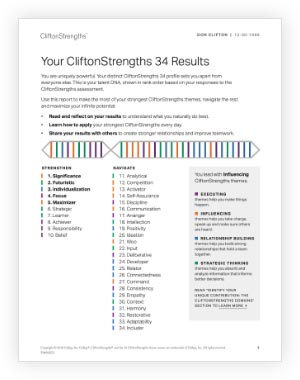Have you seen The Onion headline "Study: Anxiety Resolved By Thinking About It Real Hard"?
If you have multiple Strategic Thinking themes in CliftonStrengths (Strategic, Intellection, Learner, Ideation, Analytical, etc.) -- this headline probably sums up your daily struggle pretty well. When in doubt, think more!
A tendency toward strategic thinking has a lot of benefits on a team. You can identify roadblocks for others far in advance. You can help people see the big picture when problems arise. And you naturally notice how each individual contributes to the success of the group.
And yet the habit of that type of thinking can also get you in trouble sometimes. At least once every day, you probably kick yourself for not being able to make decisions faster, take action quicker and get out of your head.
Perhaps you took the CliftonStrengths assessment with excitement, only to cry out a year later, "My talents are killing me!"
For leaders, it can sometimes feel like what makes them unique is the very reason they doubt their ability to lead. Someone with Context wishes they could stop looking to the past and be more visionary. Or a Maximizer can't seem to finish anything because nothing is ever perfect. As a result, we all try to fit ourselves into a single "Type A" personality mold, no matter how awkward we feel or look.
On the worst days, it can feel like your bad habits and your natural gifts are very close to the same thing.
And that kind of makes sense: Your talents are your default settings. When you feel stressed, anxious or worried, you rely on the tried-and-true patterns of behavior that are most natural to you.
When you use your talents, you feel good. You have more control. The world makes sense. For leaders, their greatest successes have likely come when they were using their strengths. So naturally, when stressed or anxious, they try to find that same mindset again.
But there's a difference between using your talents to succeed in life and using them to hide from life. One way helps you grow, the other works like an autoimmune disease -- turning your best natural defenses against you.
Here are a few things leaders can do to avoid getting into trouble with their talents:
1. Don't try to "fix" your CliftonStrengths themes.
Gallup defines talent as those unique patterns of thought and behavior that cannot be changed. It is simply the lens through which you view the world. Whenever you try to manage, hide or avoid your talents, you never feel right inside. Because you need to do what you're good at to feel good about yourself. And your team needs you and your talents! Your talents are your golden ticket to excellence. If you want to be an exceptional leader, you must use your competitive advantage. So never avoid, discount or try to "turn off" your innate abilities.
2. Pause, breathe and redirect your talents.
Just because you have certain patterns of behavior doesn't mean you must follow them wherever they lead, regardless of the outcome. When you see your talents harming your team's performance -- perhaps fostering competitiveness with another team when collaboration is more appropriate -- recognize that this path isn't productive, and think (or talk with a peer) about how you can use your strengths to get the results you really want.
3. It's easier to change a workspace, job, community or relationship than your talents.
The truth may be that the problem isn't you. It's the situation. There may be a better environment where you will thrive -- and where your talents will be appreciated. Changing your space to fit your ideal work environment is far more effective than trying to become a different person.
4. Learn how to navigate your entire CliftonStrengths 34 profile.
You may be very familiar with your Top 5 CliftonStrengths -- but do you know your "deep strengths"? Challenges arise, and opportunities present themselves when you need to look past your strongest CliftonStrengths and pair them with talents that are more supportive in nature. From recognizing blind spots that may exist in your top CliftonStrengths to understanding how a particular theme may be a weakness at a given time, exploring your entire CliftonStrengths 34 results instead of just scratching the surface empowers you to take your personal development to a deeper level.
5. Focus on your well-being to lead better.
Well-being is the foundation for a rich and fulfilling life. Chronic financial worries, a lack of purpose, social isolation -- these can turn our best attributes against us and cripple our ability to lead. Self-care doesn't just mean a day at the spa; it also includes things like using your Significance to give back to your community or feeding your Relator by spending time with a close friend. In fact, Gallup research finds that the more hours a day you spend using your strengths, the less likely you are to report experiencing worry, stress, anger, sadness or physical pain the day before. Conversely, the more hours per day you believe you used your strengths, the more likely you are to report having ample energy, feeling well-rested, being happy, smiling or laughing a lot, learning something interesting, and being treated with respect.
6. Find others to help you in areas where you're not strongest.
Leadership can be lonely. But if you spend too much time by yourself, you can create an echo chamber where it becomes impossible to see new solutions. Whether it's a manager, mentor or friend, you need to share yourself with other people. In his book Vital Friends, Tom Rath describes how different people provide different things in a relationship. We were made to be unique (and a little weird) so that when we come together, we bridge each other's gaps. Understanding where your CliftonStrengths profile differs from those you work closest with can help strengthen your teamwork and boost its outcomes.
7. Create a personal strengths hall of fame.
Don Clifton, the inventor of CliftonStrengths, once said, "We are never so strong as when we have clearly in mind our successes." Just because your strengths are tripping you up now, doesn't mean they always trip you up. Keep a "highlight reel" of your biggest accomplishments. When you get into trouble, reflect on how you led others when you were at your best. Did you take charge and make confident decisions? Or did you exude calm positivity and optimism? Or did you reframe the situation for others in a persuasive way? As you reflect on these times, you will discover new ways to recreate that magic again.
It is perhaps an unavoidable flaw in human psychology to see the best things about ourselves as limitations, rather than gifts.
But as Italian writer Roberto Calasso once wrote, "A life in which the gods are not invited is not worth living. It will be quieter, but there won't be any stories."
The world's problem is not that there are too many heroes. It is too many leaders standing on the sidelines, thinking that if only they could fix what makes them weird, they might have something to contribute. But to give up on your talents is to give up on yourself. And, on behalf of the world, never give up on that.
Learn more about how a strengths-based approach to leadership can help you succeed:
- Download the new premium CliftonStrengths 34 Report.
- Hire a coach to help you develop and use your CliftonStrengths to accomplish your goals.
- Learn why bringing a strengths-based approach to your teams and the entire organization is essential for boosting the outcomes that matter most.



